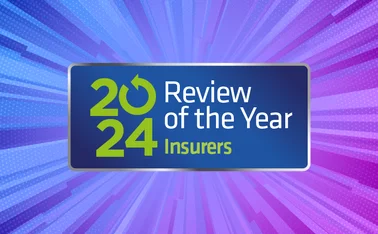
How's my driving?
Running a fleet of vehicles is hardly a risk-free proposition but insurers have rarely shown any interest in helping their commercial motor clients mitigate the dangers they face. Now their clients are starting to demand the advice they deserve, explains Kevin Edwards
Sustainable and profitable service businesses are always built around the customer. Put simply, this means continually listening to customers and adding value by meeting their needs.
Traditionally, however, motor fleet insurance has focused on price, with little attention to creating real customer value beyond some claims service improvements. Customers have been led to the conclusion that it is just a compulsory commodity purchase. Furthermore, the profitability of insurers and brokers has been tied to the premium peaks and troughs of the insurance cycle, frequently ending up in poor results.
That said, this may be changing as new opportunities present themselves. For example, listening to customers reveals a fast-growing appetite for advice on a subject that is traditionally associated with property and casualty insurance - namely, risk management.
Motor management
During the past 12 months, the commercial motor and fleet press, as well as trade conferences, have increasingly focused on motor risk management. There are also a growing number of articles, supplements, guides and presentations produced from a range of service providers who are beginning to listen to their customers and meet their needs. In fact, 'duty of care' was voted as the headline subject at a recent specialist fleet conference.
Disappointingly, however, many insurers and brokers are conspicuous by their absence on this subject. Perhaps they are too busy chasing ever-decreasing premium, commission income and profitability to notice what the customer wants?
Driving for work produces 1000 deaths and 12,000 serious injuries each year, which has been estimated to cost UK industry £3.5bn per annum. Undoubtedly, fleets are a problem waiting to be solved: high mileages, predominantly male drivers, speed, fatigue and skill issues all result in high accident and fault rates.
Yet our own research has found that 85% of customers are still not operating basic risk management measures, such as driver vetting and induction, periodic licence checks, inspecting drivers' handbooks, incident reporting and investigation, and incident analysis. In addition, less than 8% of customers have conducted any form of driver training.
Safe and efficient management of fleets can not only save lives but also provide significant bottom-line savings in fuel, tyre, maintenance and downtime costs.
Any discerning fleet underwriter should not only want to know the exposure but also how it is managed. This should be reflected in acceptance, pricing and terms. Good management translates into fewer accidents; it should also produce sustainable reduced insurance costs for the customer.
The fundamental duty of care to manage motor-related risks, along with all other risks at work, has long existed under health and safety legislation. Unfortunately, the absence of specific regulation previously led to some confusion among customers. This was resolved in 2004 when the Department for Transport and the Health and Safety Executive issued a guide to driving at work. While not the formal code of practice that many had called for, for the first time vehicles were acknowledged as part of the workplace.
Several developments have followed, further raising the profile of the duty of care for vehicles used for work. The Working Time Regulations have established the maximum number of hours that commercial vehicle drivers can complete over a given period of time. Adherence will become more demanding from January next year when all new commercial vehicles more than 3.5 tonnes must be fitted with digital tachographs. The much-publicised Corporate Manslaughter Bill is also likely to place greater duty on senior management regarding loss of life in the workplace.
In addition, the Association of Chief Police Officers has produced a guide to investigating fatal and serious road traffic accidents. This includes a focus on whether the driver was at work, and the condition of the vehicle. In fact, police forces are now treating road traffic accident fatalities as 'unlawful killings'. Even the current review of Riddor, the workplace injury reporting regulations, contains specific focus on the possible inclusion of road traffic accidents.
And it is not just companies providing owned or leased vehicles that have a duty of care - the duty applies equally to employees driving for business in their own vehicles or those provided under employee car ownership or personal-contract-purchase arrangements.
Computer monitoring
Technology is, however, helping organisations improve their risk assessment, proactively taking remedial action before accidents happen. Telematics is a fleet management tool increasing in popularity: 72,000 units were sold to business customers in 2004.
Armed with data on an individual's driving habits such as speed, mileage, journey times, breaks and braking patterns, companies can build a new dimension into the assessment and management of their risk. This can help to make further savings on operational costs and minimise risks - for example, through the implementation of driver training courses.
As a fleet insurer, Norwich Union is planning to meet a 25% increase in demand for on-site fleet consultancy services in 2006 and rolling out increased numbers of fleet safety workshops.
Customer feedback shows that 50% of customers are satisfied with the motor risk management advice provided - this offers the opportunity to build long-standing tripartite relationships between customer, broker and insurer. Encouragingly, during 2005, we have also seen a growing number of brokers attending site visits and workshops with their customers.
Building a sustainable and profitable business means being better at listening to customers and exceeding their expectations in providing the services and advice they require.
Increased concern from customers over their duty of care, coupled with the predicted hardening of motor fleet insurance rates, means that the industry has the opportunity to help deflect the primary focus away from price by providing real value to fleet customers.
Rest assured that if we, as insurers, do not, then somebody else will.
- Kevin Edwards is head of motor underwriting at Norwich Union.
Only users who have a paid subscription or are part of a corporate subscription are able to print or copy content.
To access these options, along with all other subscription benefits, please contact info@postonline.co.uk or view our subscription options here: http://subscriptions.postonline.co.uk/subscribe
You are currently unable to print this content. Please contact info@postonline.co.uk to find out more.
You are currently unable to copy this content. Please contact info@postonline.co.uk to find out more.
Copyright Infopro Digital Limited. All rights reserved.
As outlined in our terms and conditions, https://www.infopro-digital.com/terms-and-conditions/subscriptions/ (point 2.4), printing is limited to a single copy.
If you would like to purchase additional rights please email info@postonline.co.uk
Copyright Infopro Digital Limited. All rights reserved.
You may share this content using our article tools. As outlined in our terms and conditions, https://www.infopro-digital.com/terms-and-conditions/subscriptions/ (clause 2.4), an Authorised User may only make one copy of the materials for their own personal use. You must also comply with the restrictions in clause 2.5.
If you would like to purchase additional rights please email info@postonline.co.uk







